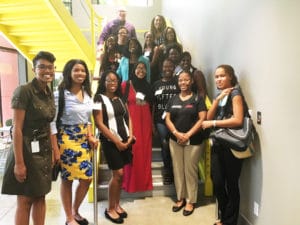Opening Minds and Doors for Southland Students in the GIS Field

Global mapping leader Esri describes the field of Geographic Information Systems (GIS) as “the science of where,” with endless possibilities for using this technology to gather and analyze geographic data. The world of GIS is projected to grow in coming years: The U.S. Bureau of Labor Statistics has classified GIS as a “new and emerging field,” and predicts it will become increasingly essential in solving many of today’s challenges.
Whitney Kotlewski, a doctoral student in the university’s Center for Information Systems & Technology, has been working in the GIS world for five years, and it didn’t take long before she noticed the workforce was lacking in women of color.
“I was walking around, looking for others who looked like me, and I didn’t really see that representation,” she recently told us.
Does GIS need a boost in diversity? For Kotlewski, the field’s wide open.
Job openings in GIS are projected to rise, and Kotlewski is seeking to build diversity in the GIS workforce by partnering with an Esri colleague. Together they founded Black Girls Mapping Action to Pioneer Progress, or Black Girls MAPP, to connect and empower women of color working in GIS and to encourage others to explore the field.
Kotlewski’s first quest with Black Girls MAPP was to identify black women in the U.S. who work in GIS by using the very software she helped design. From there, it was all about getting everyone connected and figuring out how to inspire a younger generation to pursue a career in GIS.
It’s no secret the job market is a shifting landscape and that newcomers may lean toward careers in technology. This rising number of technology careers could provide a significant opportunity for students of color if they are guided early on to pursue these careers.
Data from Arizona State University show that of the people working in computer and information science, only 35% are women. More significantly, of the relatively few women in this field, only 12% are black or Latinx.
Kotlewski and Black Girls MAPP are focusing on increasing those numbers by sharing their passion for GIS with students in the region.

“Most people who get involved in a field like GIS have done so because they’ve had a mentor tell them they should take a computer science class. They never grew up thinking, ‘I want to work as a UX Manager,’ ” she explains. “That’s why it’s so important for Black Girls MAPP to visit schools to teach – not just black girls, but other kids of color – about GIS and the type of problems they can solve with it.”
Black Girls MAPP goes a step further in its efforts to help marginalized communities and the issues they face. Members take a unique approach to address community problems by utilizing the power of GIS. Kotlewski hopes that these efforts will empower marginalized communities to visualize social issues by using GIS to create solutions.
Kotlewski is an innovator, musician, mother, college hall of fame athlete, graphic designer, and doctoral student. Is there anything she won’t take on? Absolutely not.